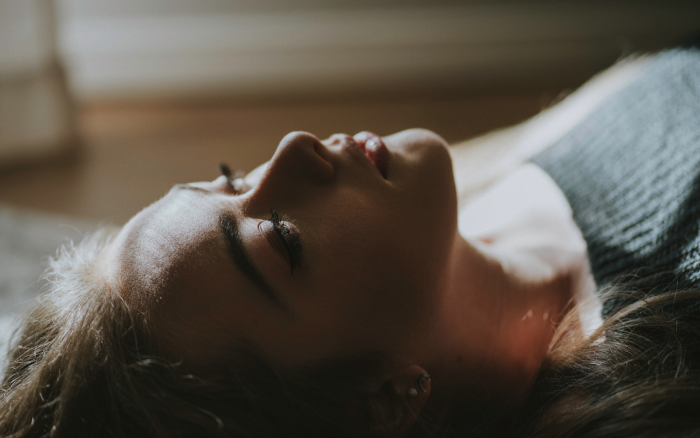Chronic pain affects more than 50 million adults in the United States.
My old self would hear that number and say, “There’s no way they experience pain like I do” or “I bet they aren’t my age.” It was always hard for me to believe that anyone else knew what this pain felt like.
Chronic pain entered my life when I was 18 years old. Along with many other ailments like migraines, psoriasis, malabsorption, and PCOS (Polycystic ovary syndrome), chronic pain began to rule my life. I spent so much time fighting it, doing everything in my power to hide it and suppress it. I often felt like a burden to others, inferior and broken.
When my pain interfered with my ability to focus, I started failing classes. When my pain interfered with my ability to move my body normally without pain, I had to leave my career. When my pain became too burdening for others, I lost those relationships. When my pain became my identity, I developed depression. When I saw my pain as the culprit to so much loss, I resented it.
It took seven years before I really began to shift my relationship to my pain.
Along the way, this is what it taught me:
1. Pain is inevitable; suffering is optional.
In the human experience, pain is unavoidable. We experience pain throughout our lifespan in hundreds of ways. Through a breakup, the loss of a loved one, a sports injury, an illness, a car crash, a bellyache, pain is present. The way we respond to that pain is what determines our suffering. Often times our response to pain involves negative self-talk that sounds like:
“Why me!?”
“I’m broken.”
“What’s wrong with me?”
“No one else understands.”
“I’m never going to get better!”
When we reclaim the power that lies within the space between our pain and our response, suffering becomes a choice, not a default. When we choose to use that space in between to grow, to love, and to appreciate, suffering cannot exist.
2. Our bodies are our messengers.
It starts with a simple ache that we brush off as “nothing” or a few days of fatigue we chalk up as “just stress.” We experience discomfort for a reason. When there is a physical, emotional, mental, and/or spiritual imbalance within us, our body lets us know. Through pain, our body responds accordingly to signal that something is wrong. This is brilliant; however, so many of us have been conditioned to see these “messages” as a sign of weakness. We’ve been taught that pain is inferior, pain is bad, pain is weak.
So what do we do when pain or discomfort arises? We push it away. We escape through medication, substances, and quick fixes only to find the pain returning a day, a week, or years later. Why is this? We cannot simply put a Band-Aid on our pain (unless we scrape a knee).
Pain is our body’s best way to communicate to us, and it’s our responsibility to listen. The more often we become curious about what our body has to say, the sooner we can arrive at feeling good.
3. Pain breaks us open to greater depths of understanding.
There is a quote by Rumi that says, “You have to keep breaking the heart for it to open,” and as sad as it sounds, it’s true. For both the heart and the body. The greater the pain I experienced, the greater I began to understand suffering.
Each time I had a setback or flare-up, I returned with a deeper “knowing.” I expanded my capacity for compassion for myself and others. I broadened my lens for seeing pain within others and having greater space to hold for those who came to me for help. Pain, although my greatest enemy at times, has also been my greatest teacher.
4. A dysregulated body is a depleted body.
When we are consistently suppressing our emotions, our needs, and our desires, our body learns to adapt to the demands we place onto it. Between stressful jobs, relationship conflict, trauma, family drama, and the good ol’ day-to-day expectations of society, we can become significantly dysregulated. Our nervous system, the one responsible for storing all of our lived experiences and responding to external stimuli with the intention of protecting us, goes “out of whack.”
The longer we stay in these modes of dysregulation, the sooner we become depleted. Depleted of energy, capacity, patience, resilience, and overall life force. Without all of this needed life force, and without replenishing it, our body must find a way to alert us.
Remember how I talked about our body being a messenger? This is how that happens. Anxiety, stress, depression, pain, and all “ailments” are signs of dysregulation. Emotional regulation is imperative for a healthy, pain-free body. Period. Without regulated emotions, our body cannot fire and wire properly.
5. There is freedom in self-responsibility.
It is much easier to stay in the warmth of a victim mindset than to claim responsibility for our life. I did this all too well. I spent a long time waiting for others to fix me, blaming my illness on lack of resources. I stayed trapped inside the belief that it’s someone else’s responsibility to help me since I had already endured so much suffering and that I shouldn’t have to “fix” what should have been moved through years ago. This created more suffering. By reclaiming the power I hold over my own life, healing, and journey, I came to know self-responsibility.
6. It’s not your job to make others understand you.
It is our responsibility to do our inner healing. It is not our responsibility to make others understand us or what we go through. No one will ever live anyone else’s experience. Therefore, they simply will never fully understand to the depths we sometimes wish they would. I often heard voices around me so confused as to “how” I was sick or in pain at my young age. I would hear things like:
“Everyone has aches and pains.”
“It’s all in your head. You seem fine.”
“You never feel good!”
“Why aren’t you drinking? Why aren’t you going skiing/surfing/running with everyone else? What’s wrong?”
Comments like this would come my way daily from close friends and family members who just did not understand me. I craved for their understanding, and I worked hard to help them understand. But I was exhausted. In the end, it’s not our job to make anyone else understand us. They either do, or they don’t.
7. Pleasure is Possible.
Among all the pain, pleasure can seem impossible. It did for me for a long time. Play, pleasure, and joy were all infrequent experiences that I learned just “weren’t for me.” I was so used to being “punished” by a muscle strain or injury any time I took a risk. I was so used to having pain accompany pleasure. I was so used to joy being triumphed by the unavoidable alert signals going off in my body. Until the desire for joy raged so fiercely within me, I couldn’t deny it. I finally ran and ate foods I feared. I gave in to the possibility that I, too, can enjoy the simple pleasures of life. And I lived. Instead of telling my body, “We can’t,” I showed my body, “We can.” By befriending my body and really understanding my pain, I learned that pleasure is possible.
8. Falling Apart Is Liberating.
In a system where unraveling is unacceptable, falling apart is so damn liberating. Breakdowns, tantrums, crying in your car to the song “Iris” by The GooGoo Dolls, completely unplugging, taking a hiatus, screaming into the ocean. This is liberation. Letting yourself give zero f*cks from time to time is sometimes the best medicine. Let it happen. There is no shame here.
9. Pain doesn’t make you broken.
Know this: your pain does not make you broken. Nothing makes you broken, except maybe a broken arm. But you, as a whole, as a human, as a being, are never and never will be broken.
10. You are your own healer.
The most important lesson to take away from chronic pain is the power we hold within ourselves. This one ties in with self-responsibility but goes a step further. We are born with an innate ability to heal. Our body knows what to do. Our intuition knows the way.
It took me seeing a dozen doctors, several traumatic procedures, a list of different diets, thousands (thousands) of dollars in supplements and bodywork, and a whole lot of shattered hope to arrive at the understanding that there is no greater healer for my body than myself.
We can only reach the depths of a rich and fulfilling life if we first have reached those depths within our relationship to ourselves. We cannot simply feel free in any experience until we have first found freedom with ourselves.
We cannot sip the sweet waters of unconditional love until we first hold that love for our bodies. We cannot feel liberated if we are constantly dysregulated. We can only find what we’re looking for when we look within ourselves first to find it. There are no greater answers than the one you already have.
You are your own healer.
For those suffering through pain, chronic illness, loss, heartache, depression, anxiety, and shame: I wish you nothing but strength, liberation, compassion, love, and healing. Keep going.


 Share on bsky
Share on bsky





Read 4 comments and reply